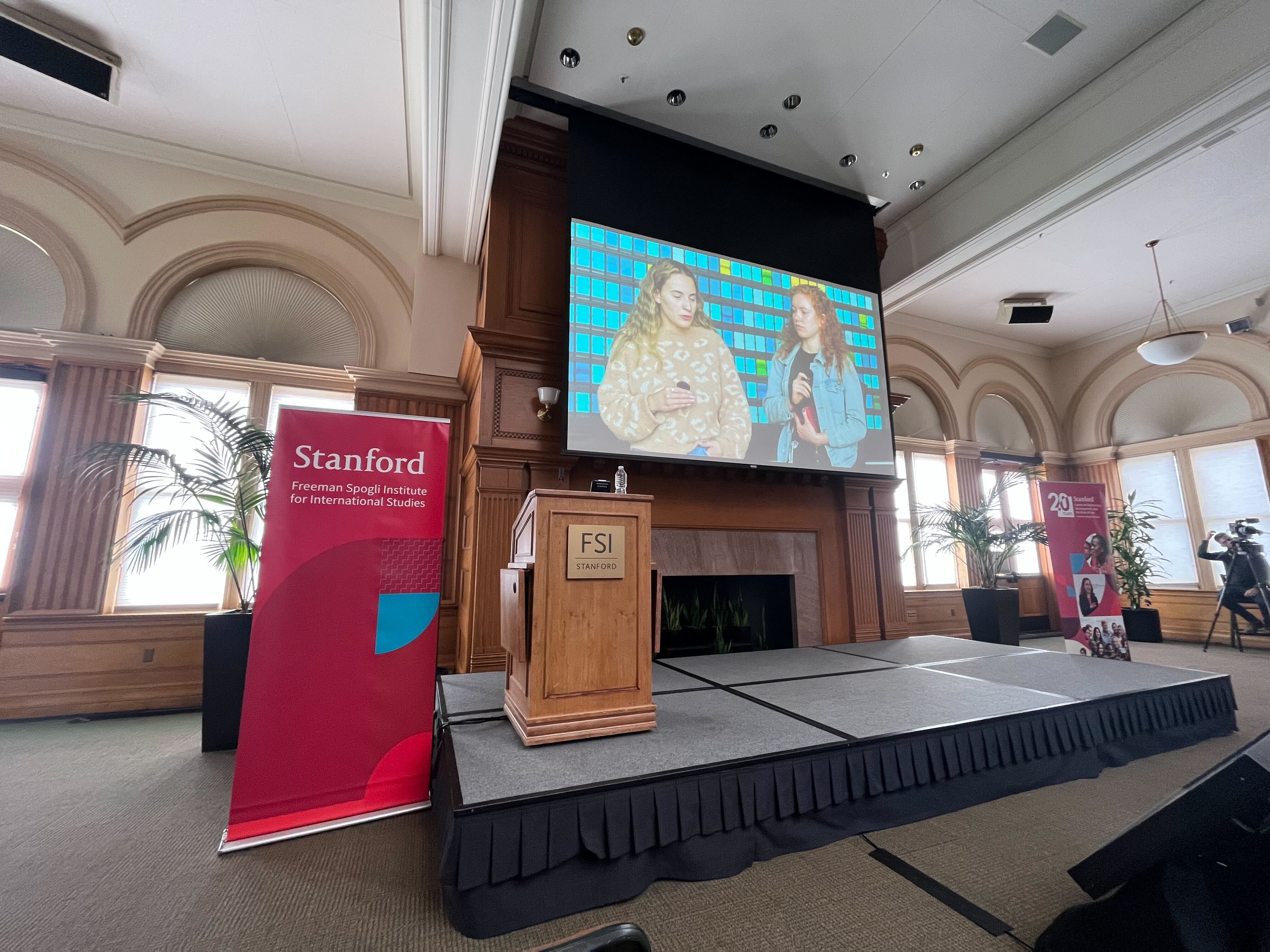At a panel commemorating the one year anniversary of the invasion of Ukraine on Friday, four high-profile Ukrainian political and civic leaders currently based in Kyiv discussed the impact of the Russia-Ukraine war on daily life, the global democratic order and Ukraine’s future.
A year after Russia invaded Ukraine, President Zelensky, who previously spoke at Stanford, continues to formulate a peace plan and call for international support. President Biden’s surprise visit to Kyiv this past Monday reflected the United States’ role as Ukraine’s biggest financial supporter in the war, including billions spent on military aid.
The panel was jointly hosted by the Freeman Spogli Institute for International Studies (FSI) and the Center on Democracy, Development, and the Rule of Law (CDDRL). Kathryn Stoner — the Mosbacher Director of the CDDRL — introduced the panel, and Michael McFaul ’86 M.A. ’86 — the director of FSI and a former U.S. ambassador to Russia — moderated the discussion.
The four Ukrainian political and civil leaders spoke over Zoom. Oleksiy Honcharuk served as the 17th prime minister of Ukraine from 2019 to 2020. Serhiy Leshchenko is a former journalist, member of Ukraine’s parliament and an advisor to Ukrainian President Volodymyr Zelensky’s chief of staff. Human rights advocate Oleksandra Matviichuk is the head of the Center for Civil Liberties, which was a co-recipient of the 2022 Nobel Peace Prize. Oleksandra Ustinova is the People’s Deputy of Ukraine and a member of Ukraine’s parliament.
Audience members ranged from students and families visiting for Family Weekend to public figures like the former President of Mongolia. Attendees were encouraged to dress in Ukrainian colors, and many wore Ukrainian-flag-colored accessories and attire with slogans supporting Ukraine.
The panelists expressed feeling tired and frustrated but, above all, hopeful and proud to be Ukrainian. Expanding the question to democracy, panelists applauded the resilience of Ukraine in demonstrating the “soft power of democracy” through its continued role as a “beacon of democracy” in the Soviet region. The resilience and hope of Ukrainian citizens, Matviichuk said, is an example that “people fighting for democracy and freedom are much more powerful than the second [largest] army in the world.”
Just in the hour prior to the event, Ustinova said that Ukrainian citizens had been informed that there would be a large-scale missile bombardment on Ukraine that night.
“We know we can be hit any day; We will die any day. But this is the reality we have to live in,” Ustinova said.
A former scholar with Stanford’s Ukrainian Emerging Leaders Program, Ustinova was nine months pregnant when the war began. She recalled lying to her doctor in order to board a plane to DC, where she lobbied U.S. congressional members for weapons “because the baby has to go home.”
When asked to respond to American misconceptions of the war, Ustinova said that Americans often hold exaggerated understandings about the time and money it would take to win the war.
“That amounts to around $15-20 a month that American taxpayers pay to fight our war,” Ustinova said. “For Ukrainian citizens, it isn’t about $15 or $20 dollars. For us, it’s about lives.”
When asked what a victory for Ukraine looks like, Ustinova said “our victory is the total liberalization of each piece, each kilometer of the captured territory since 2014.”
“Thanks to your support. Thanks to our creativity. Thanks to democracy,” Honcharuk said, adding that he is grateful for “this melting pot” working towards Ukraine’s freedom.
Ustinova said that she is often asked if seeking out peace terms with Russia is the answer to ending the conflict; however, she noted that historically these agreements were ineffective. The 2014 Minsk agreements — a series of rejected international agreements seeking to end conflict and restore Ukrainian sovereignty — are an example that peace treaties wouldn’t stop Putin, Ustinova said.
Leshcenko offered a similar sentiment in regards to combating Russia’s pervasive disinformation campaigns. He compared Putin to Hitler, referring to the hundreds of Ukrainian villagers held captive in the basement of an elementary school by Russian soldiers as “concentration camps.”
“What happened in the village was just the worst example of genocide, and all of this propaganda is not regular propaganda because the support in Russia is only possible when it’s supported by bloody, brutal and very primitive propaganda,” Leshcenko said.
In answer to former President of Mongolia Elbegdorj Tsakhia’s question about China’s President Xi Jinping and corruption in Ukraine, the panelists emphasized efforts to support anti-corruption institutions, calling upon stronger support from international partners.
“This is not a Ukrainian war. This is Ukranians fighting for the world,” Ustinova said, adding that other countries like China would be watching, and a Ukrainian loss to Russia would be a loss for “all the democracies that could not stand together” with Ukraine.
“This is a civilization war, and if the West loses in Ukraine it’s going to be a total collapse for the rest of the world,” Ustinova said.
As the event drew to a close, Honcharuk recalled his intellectual discussions and the friendliness he experienced as a guest at McFaul’s house. After a Ukrainian victory, he said he looks forward to the opportunity to enjoy these experiences “as soon as possible.”
“The next anniversary will be in Crimea,” Ustinova said.
